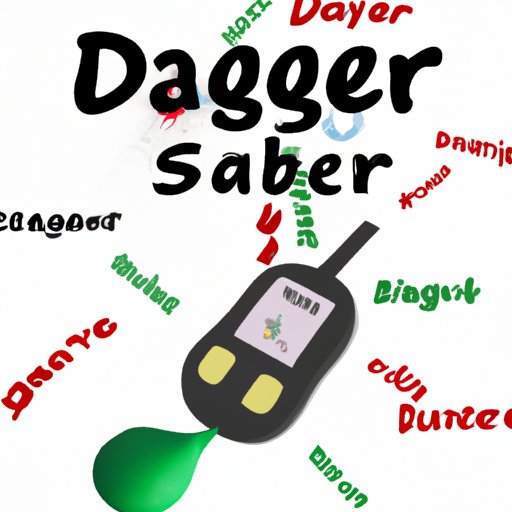Introduction
Having low blood sugar (hypoglycemia) while sleeping can be a serious health concern. It can cause disruptive symptoms that can interfere with your sleep, as well as increase the risk of long-term health problems. In this article, we will explore what happens if your blood sugar gets too low while sleeping.
Definition of Low Blood Sugar
Blood sugar, or glucose, is the main source of energy for your body. When you eat, your body breaks down carbohydrates into glucose, which is then released into your bloodstream. Your body regulates the amount of glucose in your blood by releasing insulin. If your body does not produce enough insulin, or if it produces too much, your blood sugar levels can become too low or too high.
In general, normal blood sugar levels are between 70 and 140 milligrams per deciliter (mg/dL). Anything below 70 mg/dL is considered low blood sugar, or hypoglycemia.

Overview of the Dangers of Low Blood Sugar During Sleep
When your blood sugar drops too low while you’re sleeping, it can cause a number of disruptive symptoms, such as shaking, sweating, confusion, and headaches. Low blood sugar can also affect your hormones and disrupt your circadian rhythm. Additionally, it can increase your risk of hypoglycemia, which can have serious long-term consequences, such as an increased risk of accidents and severe fatigue.

How Low Blood Sugar Can Affect Your Sleep
When your blood sugar drops too low, your body releases hormones to raise your blood sugar back to normal levels. These hormones can cause a surge of energy, which can make it difficult to fall asleep or stay asleep. Additionally, low blood sugar can cause difficulty concentrating, which can make it harder to stay focused on tasks and can also interfere with your ability to remember things.
Low blood sugar can also disrupt your circadian rhythm, which is your body’s natural clock. This can lead to difficulty falling asleep at night and feeling tired during the day. The disruption of your circadian rhythm can also lead to poor quality of sleep.

Symptoms of Low Blood Sugar During Sleep
If your blood sugar drops too low while you’re sleeping, you may experience a number of different symptoms. These can include:
- Sweating
- Shaking
- Confusion
- Headaches
If you experience any of these symptoms while sleeping, it’s important to take action right away to address your low blood sugar.
What to Do if You Experience Low Blood Sugar While Sleeping
If you experience low blood sugar while sleeping, it’s important to take action right away. The first step is to eat or drink something sugary, such as a glass of juice or a piece of candy. Then, test your blood sugar to make sure it has returned to a normal level. Lastly, monitor your symptoms to make sure they don’t return.
Understanding the Dangers of Low Blood Sugar at Night
Low blood sugar while sleeping can be dangerous, as it increases your risk of hypoglycemia. Hypoglycemia is a condition in which your blood sugar drops too low, causing symptoms such as confusion, dizziness, and blurred vision. Severe hypoglycemia can even lead to loss of consciousness and coma. Additionally, low blood sugar at night can cause severe fatigue during the day, as well as an increased risk of accidents.
How to Avoid Low Blood Sugar While Sleeping
There are several steps you can take to avoid low blood sugar while sleeping. The first is to eat dinner at least two hours before bedtime. This will give your body time to digest the food and regulate your blood sugar levels. Additionally, it’s important to monitor your blood sugar levels before bedtime to make sure they are within a normal range. Regular exercise can also help regulate your blood sugar levels. Finally, it’s important to avoid alcohol and caffeine before bedtime, as they can both lead to low blood sugar.

The Benefits of Monitoring Blood Sugar Before Bedtime
Monitoring your blood sugar before bedtime can have a number of benefits. First, it can help improve the quality of your sleep, as it can reduce the risk of low blood sugar during the night. Additionally, monitoring your blood sugar can help reduce your risk of hypoglycemia, as well as help you better control your diabetes.
Conclusion
Low blood sugar while sleeping can be dangerous and can lead to disruptive symptoms and long-term health problems. To avoid low blood sugar while sleeping, it’s important to eat dinner at least two hours before bedtime, monitor your blood sugar levels before bedtime, and avoid alcohol and caffeine. Additionally, monitoring your blood sugar levels before bedtime can help improve the quality of your sleep and reduce your risk of hypoglycemia.


